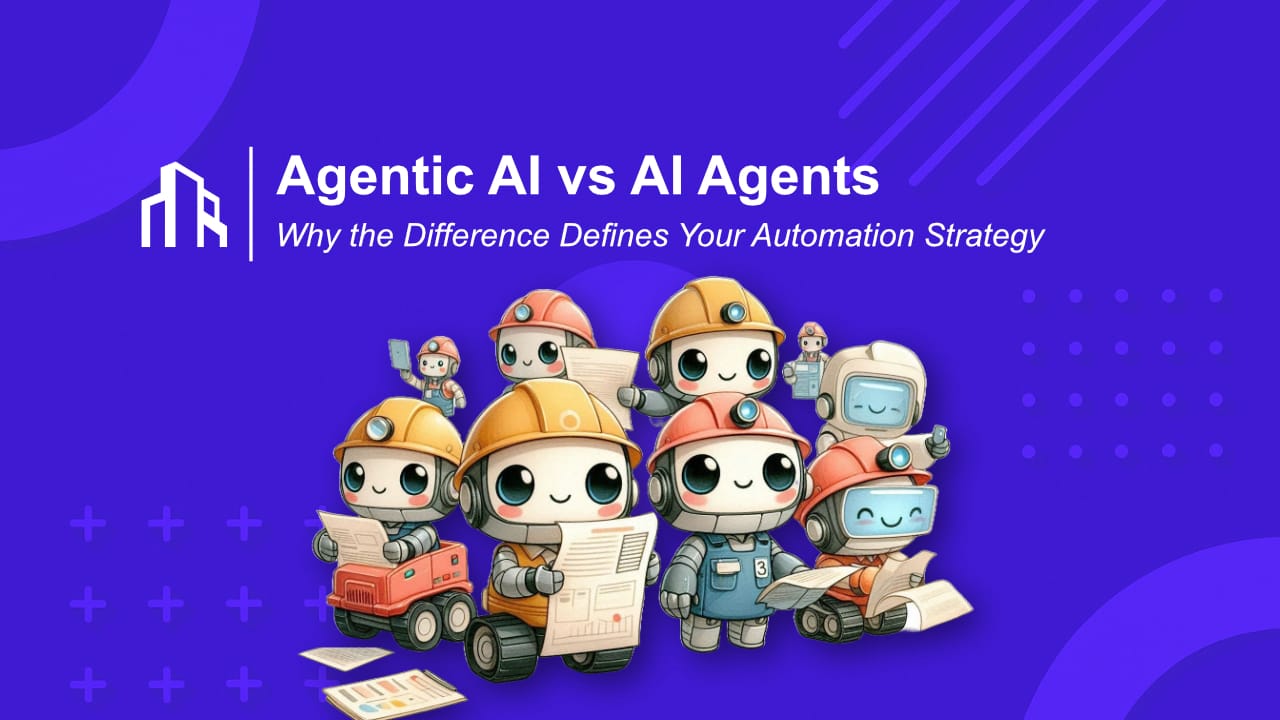Agentic AI vs AI Agents: Why the Difference Defines Your Automation Strategy
Most teams confuse static AI agents with truly agentic AI. Learn how agentic systems think, plan, and adapt.

The line between AI agents and Agentic AI is widely misunderstood. Many teams deploy agents that simply follow instructions. They are not building systems that reason, plan, and act toward goals. If your objective is scale, resilience, and lower operational drag, this distinction is critical. It determines how fast you execute, how much oversight you need, and how competitive you remain.
What Makes an AI Agent
AI agents are predefined digital workers. They execute structured tasks such as sending an email, updating a CRM, generating a report, or replying to a prompt.
They rely on static workflows. When context changes, you update the logic. They are ideal for:
- Routine automations
- Low risk use cases
- Clear, repeatable actions
They do not reason, plan, or trade off objectives. They follow.
What Defines Agentic AI
Agentic AI represents the next stage of automation. These systems reason, plan, and act toward goals with minimal human intervention. They can:
- Interpret context dynamically
- Decide how to achieve an outcome
- Adapt workflows based on feedback
- Orchestrate multiple systems autonomously
This is autonomy in motion. It is already reshaping operations in service, finance, HR, and supply chains.
For a strategic view on how this impacts IT delivery and operating models, read
Agentic AI and IT Services Disruption: https://scalevise.com/resources/agentic-ai-it-services-disruption/
Agentic AI vs AI Agents: The Practical Difference
| Capability | AI Agents | Agentic AI |
|---|---|---|
| Decision making | Follows instructions | Evaluates goals and acts |
| Adaptability | Static | Context aware |
| Workflow design | Predefined | Self organizing |
| Autonomy | Low | High |
| Example | Email responder | Multi system AI orchestrator |
The move to agentic is not about adding more prompts. It is about removing friction so the system can decide and act.
When to Use Agentic AI and When Not To
Agentic AI shines where complexity and scale meet. It is not the best choice for narrow, deterministic flows.
Use Agentic AI for:
- Cross department coordination
- Predictive resource planning
- Intelligent onboarding and HR flows
- Dynamic customer service and case resolution
Avoid Agentic AI for:
- Regulatory reporting that requires strict determinism
- Static compliance workflows
- Fixed data pipelines with tight correctness guarantees
For cautionary guidance on where LLMs do not fit, see
From BI Dashboards to Agentic Ops: Where Not to Use LLMs: https://scalevise.com/resources/from-bi-dashboards-to-agentic-ops-where-not-to-use-llms/
Architecture Blueprint: From Static To Agentic
A practical agentic stack combines:
- Goal layer: business objectives and constraints
- Reasoning loop: planning, tool selection, reflection, retry
- Memory and context: short term scratchpad and long term episodic memory
- Tooling and middleware: reliable connectors to CRMs, ERPs, ticketing, data stores
- Guardrails: policies, audit logs, SSO, rate limits, cost controls
Scalevise delivers this with custom middleware that connects reasoning engines to enterprise systems. The result is an adaptive network of agents that collaborate and improve.
Explore our approach and reference design here:
AIRIA AI: https://scalevise.com/resources/airia-ai/
Business Impact You Can Measure
Teams that adopt agentic patterns report:
- Faster automation cycles and shorter time to value
- Significant reductions in human handoffs and rework
- Higher operational resilience during change and incidents
The primary value is adaptability. The system learns from context, prioritizes goals, and scales execution without constant redesign.
Why Most Teams Still Confuse The Two
Many platforms market themselves as agentic while running static logic behind a chat facade. Real agentic systems include:
- Goal based planning and reflection
- Persistent memory and context
- Multi tool orchestration with error recovery
- Policy aware execution with auditability
These are architectural properties, not UI features.
Build True Agentic Workflows With Scalevise
Scalevise bridges static automations and agentic systems with a headless, middleware first approach. We design architectures where agents collaborate, self optimize, and execute with minimal friction. You get measurable outcomes from day one and a roadmap to higher autonomy.
Ready to move from automation to autonomy?
Contact Scalevise: https://scalevise.com/contact
FAQs
What is Agentic AI?
Agentic AI refers to intelligent systems that can reason, plan, and act toward goals. They are not limited to predefined scripts.
How is Agentic AI different from traditional AI agents?
Traditional agents follow fixed workflows. Agentic AI adapts, reasons, and makes choices based on changing context and objectives.
Is Agentic AI suitable for every process?
No. It performs best in dynamic, cross system processes. Deterministic reporting and tightly constrained compliance flows may be better served by static automation.
How does Scalevise implement Agentic AI safely?
We use custom middleware, policy guardrails, SSO, and audit logs. We align reasoning loops with clear objectives and KPIs. We instrument everything for visibility.
